by Rick Landers
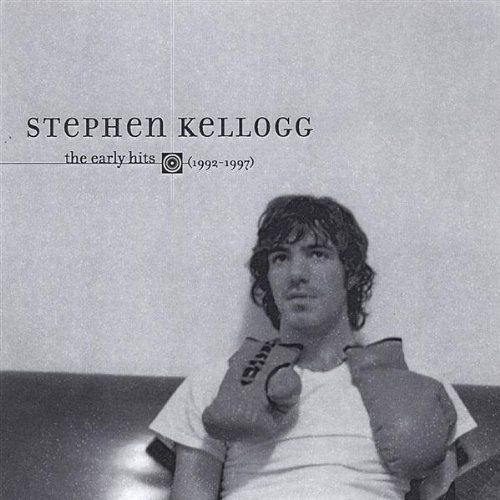 Here’s one of our earliest interviews with Stephen Kellogg from around 2006. We’d seen him as a warm up act at a venue and when he and his fellow Sixers returned to the D.C. area, we caught up with him at Jammin’ Java in Vienna, Virginia, where we sat down for an interview. Since this interview, Kellogg has gathered a large gathering of fans, toured around the U.S., been on NPR and is currently working on a 2013 solo tour.
Here’s one of our earliest interviews with Stephen Kellogg from around 2006. We’d seen him as a warm up act at a venue and when he and his fellow Sixers returned to the D.C. area, we caught up with him at Jammin’ Java in Vienna, Virginia, where we sat down for an interview. Since this interview, Kellogg has gathered a large gathering of fans, toured around the U.S., been on NPR and is currently working on a 2013 solo tour.
******
Blending the golden era traditions of folk, pop, country, and rock into a lively array of contemporary tunes, Stephen Kellogg and the Sixers are traveling the roads of America gathering steam.
Fresh out of school, Kellogg checked into the cubicle world of the music business, only to find a level of disillusionment that magnified his desire to make his own music and hit the road.
And now, with six albums under his belt and partnered with The Sixers, Keith “Kit” Karlson [bass and keyboards] and Brian “Boots” Factor [drums], he has forged a solid troupe that’s building a loyal following.
Stephen’s songs evoke the hurtful strains and ideals of young love with the self-conscious wanderings of lust. His tunes are reminiscent of the integrity we find in the musings of Jim Croce, the highway longings of a young Jackson Browne, and the kick ass songs of his idol, Sheryl Crow.
We tracked down Stephen and his band mates at both the Birchmere and Jammin’ Java in Northern Virginia while on their way up and down the East Coast before moving the party to California.
 Stephen Kellogg: The thing that got me into playing was my sister taking me to a White Snake concert. That was the linchpin that got me – looked like a fun job! I had a neighbor who played guitar who was much older than me and he was very gracious taking in a little kid and showing me things.
Stephen Kellogg: The thing that got me into playing was my sister taking me to a White Snake concert. That was the linchpin that got me – looked like a fun job! I had a neighbor who played guitar who was much older than me and he was very gracious taking in a little kid and showing me things.
It’s kind of weird and you wonder how you ever learned to play guitar because now and then I’d go over to his place and play all day — every so often have a marathon day where I’d go over and bug him all day. And then I may not go there for three months, never really setting out or thinking of myself as a guitarist.
It wasn’t until I was in college and started writing songs that I was, like, “Wow!” I knew just enough chords and the beautiful thing about writing songs is you only need a few chords and you get the bug and that was the case for me.
Rick: Were your parents supportive?
Stephen Kellogg: Yes, my mom bought me a little red electric, but my first new guitars, both electric and acoustic, were purchases or gifts from my grandfather. A Seagull acoustic that I still have and still love to play and a Tele electric Bruce Springsteen copy.
The Fox by Birmingham and both of those guitars hang on my wall in my office. The Tele has an ash body, looks good but doesn’t play that great.
I didn’t really begin playing electric until the new record, I just started playing more. I bought this new Fender Telecaster about four or five months ago. It’s not vintage, but a ’72 reissue that I play a few songs with it in the show, just getting in the groove. I’m starting to warm up to it and getting into electric more.
Rick: Were they musically inclined?
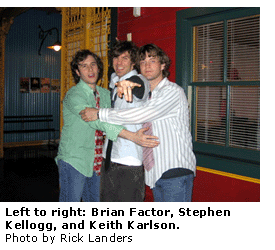 Stephen Kellogg: Well, my dad played a lot of records growing up, Jim Croce, Crosby, Stills, Nash, and Young, the Band, Cat Stevens, Fleetwood Mac. I think hearing that in my formative years has had a big impact on what we play now.
Stephen Kellogg: Well, my dad played a lot of records growing up, Jim Croce, Crosby, Stills, Nash, and Young, the Band, Cat Stevens, Fleetwood Mac. I think hearing that in my formative years has had a big impact on what we play now.
White Snake and metal influenced our show a little bit and I’ve been through phases like a big Grateful Dead phase, a big Bob Marley phase, and then a big folk phase.
Now it’s all leveled out, old school rock ‘n roll, bands like the Wallflowers and Counting Crows. They write more literate pop songs, I know that sounds a little snobby, but for lack of better words — it’s where we’re at now.
Rick: Acoustics?
Stephen Kellogg: For acoustics I’ll play other guitars, but for me Gibsons are it! There’s a Gibson connection we have in New York who loaned us some equipment and they’ve been really good to us.
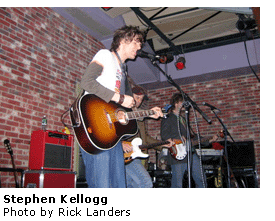 My main acoustics are a Gibson J-45 and a Gibson Southern Jumbo, almost the same guitar. Both are pretty new and I tend to beat them up. Some day, when I have more money and I’m a little more responsible (smiles), I hope to have some nice vintage Gibsons.
My main acoustics are a Gibson J-45 and a Gibson Southern Jumbo, almost the same guitar. Both are pretty new and I tend to beat them up. Some day, when I have more money and I’m a little more responsible (smiles), I hope to have some nice vintage Gibsons.
But for now, it’s these Gibsons, the Telecaster and the guitars I have at home, a couple of Seagulls, a twelve and a six-string. Somehow over the years you amass guitars.
To me they’re really tools and I treat them that way. I sweat and bleed on them, I crack them and I do maintenance too, but I really don’t sit around and look at them very much. I just sit around pick them up and write songs.
Now I’d cry if the J-45 got stolen or cracked in two. I’d be really really sad, but I’d still be swinging them around my neck with reckless abandon and take chances with them, but you know, that’s what they’re for.
For the acoustics, I do know that I love Martin medium Marquees for the acoustics. I’ve used a lot of others and feel the Martin’s are the meatiest and don’t break nearly as often as others. Of course, I’ll probably break one on one of my first songs tonight! I use Fender medium picks.
As far as amps, I’m just getting into these as a totally new thing. I have a Fender Princeton Chorus, but I’m not a big fan of it. I played this little Vox Pathfinder and it did some great things that were gratifying. Vintage Fender Twins stuff sounds nice. I could see me getting into that, but I’m still at the beginning and that’s the fun about music, there’s always something new to get into.
Rick: You went to the University of Massachusetts?
Stephen Kellogg: I grew up in Connecticut, but think of Massachusetts as my home. I went to school at UMASS and studied communications. The program is very theory based and I didn’t love it. If I did it again, I’d study history or English, especially if I knew I was going to be a musician. But hindsight is 20-20. I wish I’d studied something more tangible.
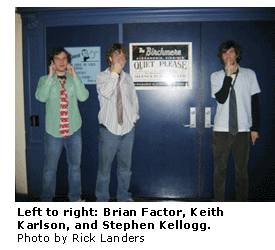 Keith studied tuba and Brian studied psychology. College was useful in a lot of other ways. One of the things I learned is that the whole party thing fits in perfectly with your lifestyle when in college.
Keith studied tuba and Brian studied psychology. College was useful in a lot of other ways. One of the things I learned is that the whole party thing fits in perfectly with your lifestyle when in college.
I did my share of partying in college. But when you get on the road where it’s totally, especially in the beginning, partying, we eventually found that exhausting and we were less consistent and sick all of the time.
Pretty much wiped out. Our friends think we party all the time, but we don’t. If I’m on vacation and I’m at home and we get a three week break, I’ll party.
Rick: Your style has a bit of traditional Bakersfield country twang to it blended with contemporary lyrics. Do you think of yourself as a country singer?
Stephen Kellogg: I haven’t done a lot of defining myself lately. I think of myself as a songwriter who plays rock ‘n roll and, you know, can evoke the acoustic element. I think the reason I stay away from the country definition is for some people it’s such a four lettered word and they get out of touch with it before you’ve even sung a lick. And at the same time, I wouldn’t want to have to go out and be like that new Shooter Jenning’s song, You Put the O Back in Country.”
I do think that country is a real part of rock ‘n roll and I love Hank Williams. I like a lot of country, like Tim McGraw. Country seems to be a thing that people either love or hate. And I think our music is broader than that.
Someone who doesn’t like country may like us, and country people who love country may not like us – I don’t use it in the description. I usually use rock ‘n roll or describe bands that we fall in line with because it’s a better way for people to get it, a better frame for our music.

Rick: How did you get into the business?
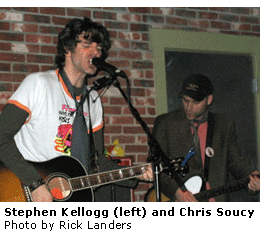 Stephen Kellogg: I played a bit in high school and was kind of the King of the Keg Party. I had a jam band with some guys in college and wrote a lot of songs and put together a collection.
Stephen Kellogg: I played a bit in high school and was kind of the King of the Keg Party. I had a jam band with some guys in college and wrote a lot of songs and put together a collection.
It’s just a mix of stuff I call “early hits” [Laughs] and then after college there’s so much pressure that you get like, “I’m an adult now”. You know college is over and what are you going to do now?
I bought into that for a while. I worked in the music business, worked publicity, I booked a club, and I sold ads for a music rag. I did learn a lot and have no regrets.
It was educational. For me it worked a lot, but this career really praises youth and they love it when you’re young, so I gained something there. But I burned up a couple years, but I needed that.
I remember calling my mom and telling her that I felt like a caged animal. I didn’t know what to do when I first got out of college. I played some bars and had to deal with hecklers.
I just felt it wasn’t worth it. So I went and did those jobs and got to where I was ready to deal the hecklers again! Ready to take my chances out there because going out and making $150 a night playing songs was better than selling ads.
So, I went out and made my solo album and tried to figure out a way to make a living making music and records. Eventually, I did that.
Rick: You were a solo act.
Stephen Kellogg: After a year doing troubadour stuff I found it was not what I dreamed about when I was little, you know, being alone.
I always wanted a band. That where the Bon Jovi and White Snake vision of camaraderie comes in and so I started seeking out bigger shows that would have a band. I’d go to shows and what I’d dreamed about wasn’t happening. I realized everyone’s dealt a set of cards and for me I was working hard writing a lot of songs.
It’s not an exceptional voice and I didn’t think doors were opening for me because of my voice. It just seemed that the harder I worked the more things seemed to get going — doors opened.
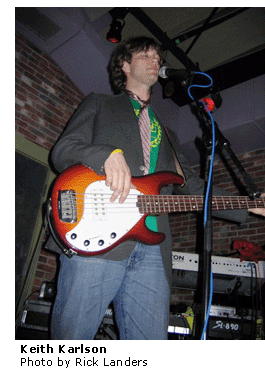 That’s when I met Keith and he was the same way. He was in a band already. We’d go out and play golf and we talked about just wanting to work hard.
That’s when I met Keith and he was the same way. He was in a band already. We’d go out and play golf and we talked about just wanting to work hard.
We just wanted opportunities and that was really stimulating, even though we didn’t always agree and things didn’t musically gel. But we were so like minded in what we were trying to do.
I was like; I want to feel better getting on stage and struggling a little bit musically, but loving this guy I’m on stage with. And so we started to become really good friends and started doing shows together.
Right about that time I got an e-mail from Brian, who was working at an indie label. I’d met him once and jammed with him in college and he told me that if I every wanted anybody to play drums with that he’d love to — then suddenly Brian was there and in a few months after Keith it was the same thing. We all didn’t quite fit musically together right.
Brian wanted to play more funky music, but he loved the band. Keith was a jazz head, a bando, he was in a marching band and was, like, in clogs and sweat [Laughs], a total band dork.
But, Keith knew how to read music and so he helped Brian and me to write harmonies for all three of us to sing. So, we felt that if we focused on our commonalities, our common links, it would work.
And I’m so proud of that and always wanted to be in a band. I’d put out all of these Stephen Kellogg records and then we were a band! I put out Bulletproof Heart last fall, met a great manager, Steve Bursky, and everything began to grow and fall in place!
Rick: Tell us about the other guys.
Stephen Kellogg: They’re Brian Factor on drums and Keith Karlson, who plays bass guitar and keyboards. The Sixers name came from a t-shirt that Boots had as a kid at camp.
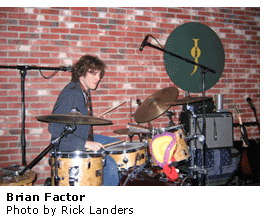 It seems we have a good balance of personalities. We have little differences like I like Hank Williams and Brian likes Ben Folds 5 better than I do, but the personalities work together well. I feel immensely blessed.
It seems we have a good balance of personalities. We have little differences like I like Hank Williams and Brian likes Ben Folds 5 better than I do, but the personalities work together well. I feel immensely blessed.
I don’t think you can have four Elvis’s; you need to have your Tom Campbell to your Tom Petty, you need these foils. And we figured out early on that we need to support each other in the band.
We really embrace the fact that each person brings different things to the talent of the group and we get a fuller picture. We let everybody be who they are. Brian brings the easy going thing, Keith’s a great foil to everything and he’s ready to take on anything. And that’s a big part of my personality, I like to have fun and realized early that Keith is a bit of a “pig will”, always wants to make the show fun and he’ll do anything, no matter how outrageous, to take the show to another level!
I love playing with him because he has that spirit and it makes everything more interesting and more fun. Brian’s quiet and doesn’t care about being center stage, so that let’s Keith be the showman and for me to be kind of a showman, anchoring the band. There’s a bunch of dynamics we’re always working on.
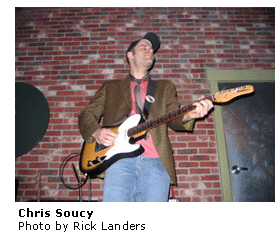 We’re also touring with Chris Soucy, a lead guitarist. He’s an old friend of mine who was on one of my first tours. I was opening for Sally Taylor, daughter of James Taylor and Carly Simon.
We’re also touring with Chris Soucy, a lead guitarist. He’s an old friend of mine who was on one of my first tours. I was opening for Sally Taylor, daughter of James Taylor and Carly Simon.
Chris was playing guitar in her band and we became friends ever since and we’ve written some songs together. The first time we took him out for rehearsal, we also took him skydiving!
Rick: How does the band handle conflicts or disagreements?
Stephen Kellogg: I think it’s a little weird to say in an interview, but I can mediate to a large degree because if you have four people sitting around and everyone has an equal vote it gets screwed up. You know our country has a president, but you need a cabinet too and that’s how we approach the band.
We’re comfortable with business. We sit down and try to be diplomatic and take into account everyone’s views and if it’s technical and I don’t know best when it comes to those things, then Keith’s president and I’m secretary. So, we all weigh in and everybody has seven jobs in this band — really.
For merchandising it’s my cousin, Jessica, who has become an expert, so I give her my two cents and she makes the decision. We’re very fortunate and it’s always a tenuous thing, but we all want things to work out.
Rick: How do you approach songwriting?
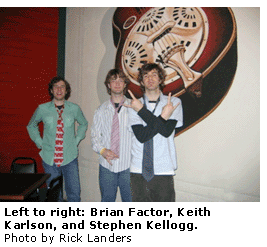 Stephen Kellogg: It varies. I have different processes and one of my goals is to utilize more to get more different, a greater variety of songs.
Stephen Kellogg: It varies. I have different processes and one of my goals is to utilize more to get more different, a greater variety of songs.
Right now, eighty-five percent of the tunes I start with the lyrics, because I write them constantly. Some reviews have called my lyrics simple. I don’t pay a whole lot attention, but does it ever occur to them that I made a song simple intentionally?
I have no problem using a cliche after shedding some light on it. I write lyrics differently if it’s going to be a fun rock ‘n roll song and sometimes poetry, but sometimes it’s just going to be rock.
Sometimes I’ll run across these guys who criticize my lyrics, like they need to be poetry, a high minded word. It kind of reminds me of poetry like in Blake or ee cummings.
Rick: Ever get writer’s block?
Stephen Kellogg: Writing songs has been a part of me for a long time and I think my confidence has grown. I don’t believe in writer’s block, although I may go through some time when I write clinkers, I never have had a time where I don’t or can’t write. I just keep writing and, you know, they don’t all have to be good. I just need to keep going and try to discern which ones are good.
Rick: Your new self-titled CD has been getting strong press. Video?
Stephen Kellogg: We did shoot a video recently and our website has some other clips. The video is for “You Changed”, but I’m not sure it will be marketed. We worked with a really cool production group.
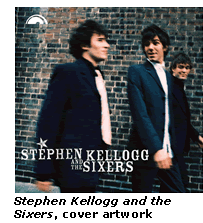 I think we have a great team and it’s going to break us through somewhere. Maybe not dizzying heights, but I believe we’re going to sell more of the new CD, and we’re well on the way to that. That makes me happy. We’re doing everything we need to do to make it work. And anything that happens beyond that is sort of leaving it to the fates.
I think we have a great team and it’s going to break us through somewhere. Maybe not dizzying heights, but I believe we’re going to sell more of the new CD, and we’re well on the way to that. That makes me happy. We’re doing everything we need to do to make it work. And anything that happens beyond that is sort of leaving it to the fates.
When I was alone I did a lot of my own stuff while working in clubs and saw how important it is to have a middle man to help. I did have some friends, but it became more than a hobby and became too big a thing for them. I’ve been really lucky though, everything seems to have happened right when we needed it to happen for us.
Rick: Where are your songwriting skills headed?
Stephen Kellogg: I spend more time thinking about great songs now. When I hear “Like a Rolling Stone” or “Take it Easy” by the Eagles, I ask myself, “What’s going on in this song that makes me feel that this is one of the best songs I’ve ever heard?”
I’ve also written a lot more songs now and I watch which ones communicate to the people in the audience more, so I think I’ve grown in that respect. I don’t think I’ve changed drastically as a songwriter.
I still have the same attitude that not everything needs to be literal, that songs are about creating tones and vibes that people can relate to that don’t need to be stories. They don’t need to tie in and I leave a little space there. And I try not to write songs that are not about me. I don’t write about politics because it’s not me now.
I don’t like to make things up very much. I like to pull it from me and the people around me.
I’d say about one-third of my songs are autobiographical, one-third biographical and then there’s the X factor. I try to write in my voice and I don’t think I’ll ever be real literate, but I try to write in my songs, the vocabulary that I use in my speech.
Rick: Have you received any helpful career advice from more experienced musicians?
Stephen Kellogg: Yes. Mark Erelli, a friend and kind of a folk rock guy who’s still battling for a spot in the popular world said something like “I don’t need to be original, I just need to be good.” And I love that. It takes a lot of pressure off, the idea that I don’t need to reinvent the wheel, just write good songs and maybe there’s a career for me.
I don’t need to be Madonna or U2 and break down the walls. I’m just a guy and this is what I seem to be good at. It’s a job — and that changed my life. It changed my life and I totally agree with its sentiment. Some people may need to be original more than they need to be good. Like Andy Warhol, more than he had to be good.
Rick: What about your fans – anything about you they might like to know about you?
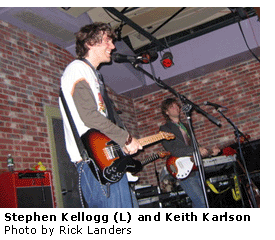 Stephen Kellogg: Our fans are always surprising. We have some neat people and that’s one of my favorite aspects of all of this. The thing I took out of my Grateful Dead phase was a love for seeing sets change, or that they never opened with the same song. I’d think, “I can’t believe they did it tonight” or “It’s the first time they ever told that story!”
Stephen Kellogg: Our fans are always surprising. We have some neat people and that’s one of my favorite aspects of all of this. The thing I took out of my Grateful Dead phase was a love for seeing sets change, or that they never opened with the same song. I’d think, “I can’t believe they did it tonight” or “It’s the first time they ever told that story!”
We’re now coming into a place that’s very neat, because some of our fans will notice the subtlies of our set and it inspires me to make each night a little different.
I want to bring back and play that song we haven’t played for three years. The fact that we have fans that are so attentive is very special to me and is very impressive. We’ve gotten stuffed animals and a stuffed cow from a fan in Georgia where we’d never been. That was nice.
The thing about me, I don’t know what fans know. I’m really a painfully normal guy and like to be home chilling out. None of this show is put on. I’m as goofy and as serious as I seem to be on stage.
I can be inconsistent and unhappy, just like everyone and a little grumpy when I’m exhausted. I’m really a normal guy. I get hurt easy like everybody. Sometimes, I think, people don’t know how normal you are, or maybe they do, it’s hard to know.
Rick: With whom would you like to work?
Stephen Kellogg: Sheryl Crow! She’d be, like the big duet! I’d love to play music with her. She is the best. Others? There are a couple producers I like , Steve Lillywhite, who produced Guster’s album (Lost and Gone Forever), it floored me, has great harmonies.
I like Ethan Johns and what he did with that Ray LaMontagne record (Trouble) and Ryan Adams (Heartbreaker/Gold). I love those people, like Sheryl Crow, who can make something that sounds current but won’t sound dated, not so hip it will date itself in a year. Right now I’m focused on Sheryl Crow, she’s terrific, my dream collaboration!
Rick: Where do you guys like to play?
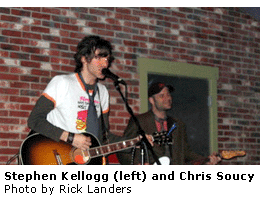 Stephen Kellogg: Really, wherever the love is, but we always look forward to playing Boston and Washington, D.C., although Bismark, North Dakota has been very good to us. On the road, we don’t sleep much, we just play and joke around a lot and search for decent meals!
Stephen Kellogg: Really, wherever the love is, but we always look forward to playing Boston and Washington, D.C., although Bismark, North Dakota has been very good to us. On the road, we don’t sleep much, we just play and joke around a lot and search for decent meals!
Rick: Favorite songs on the new Stephen Kellogg and the Sixers album?
Stephen Kellogg: My favorites on the new record are “Such A Way”, it’s a great song for me, and I love “Flower in the Rain”, it’s really me. My personality and the way I feel are captured in that one song.